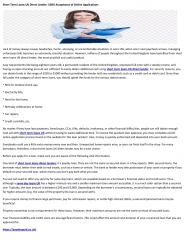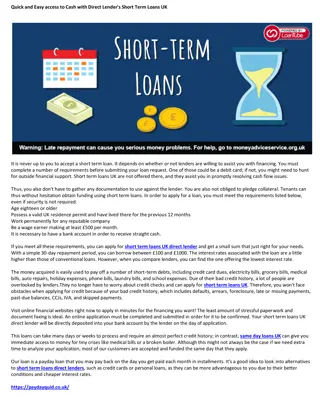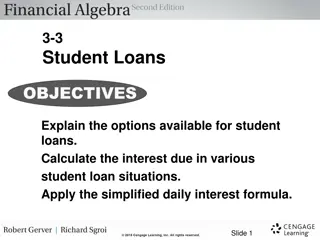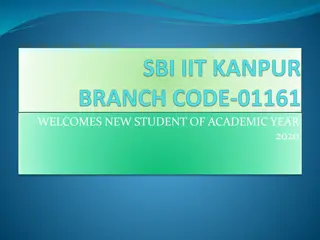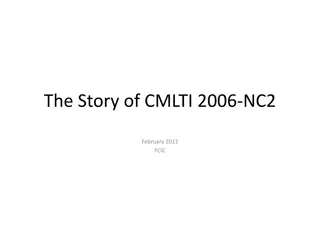Medical Student Loans: A Comprehensive Guide
Discover all you need to know about medical student loans in 20 minutes or less! Learn about federal and private loan options, how to locate and organize your loans, managing repayments during internship/residency, and more essential tips to navigate your loan journey effectively.
Download Presentation

Please find below an Image/Link to download the presentation.
The content on the website is provided AS IS for your information and personal use only. It may not be sold, licensed, or shared on other websites without obtaining consent from the author. Download presentation by click this link. If you encounter any issues during the download, it is possible that the publisher has removed the file from their server.
E N D
Presentation Transcript
Medical Student Loans EVERYTHING YOU NEED TO KNOW (IN 20 MINUTES OR LESS) MARGARET BAXTON, M.ED. ASSOCIATE DIRECTOR OF FINANCIAL AID UVA SCHOOL OF MEDICINE
Federal Student Loans Subsidized Unsubsidized Graduate PLUS Other: Perkins, PCL, LDS, HPSL Consolidation Private Student Loans Private education loans (from a bank) Institutional loans (from your school) Other Private Debt Bank loans Personal loans Credit card debt Residency/relocation loans Types of Loans During undergrad and medical school, you may have borrowed a variety of loans.
You should have received statements from all of your loan providers, even if you elected to go into deferment or forbearance. Locating your Loans It is your responsibility to make sure your loan servicer is able to contact you. If you re unsure: Ask your financial aid office Federal Loans: nslds.ed.gov Private loans: check your credit report Make sure your contact information is up-to-date!
Get and Stay - Organized Create a folder (paper or electronic) for each loan servicer, keep all correspondence/communication. Try the AAMC s FIRST loan organizer. Get a username and password for each servicer s website. OPEN YOUR MAIL. Put reminders on your calendar payments, deferment/forbearance forms, etc. Respond to any requests for payment, even if you think they re mistaken. Motley Fool Debt Workbook: g.foolcdn.com/art/seminars/downloads/debtworkbook.pdf
Internship/Residency Forbearance No payments are due, interest accrues Options during Residency Repayment Standard repayment: 10 years Extended repayment: up to 25/30 years Use www.finaid.org to compare Income-Based Repayment: based on your income and family size For your federal loans, you may choose to begin repayment, or not. For private loans, contact your loan servicer.
Internship/Residency Forbearance Available for federal subsidized, unsubsidized, GradPLUS, and consolidation loans (not Perkins) Good for 12 months at a time, must fill out the right form and have it signed Mandatory lender may not refuse Check your account online to make sure forbearance is applied correctly Beware accruing interest Set aside money each month in an emergency fund, then pay your interest before it capitalizes if you don t have an emergency
Income-Based Repayment Payment equal to 15% (will change to 10% in 2014) of income that exceeds 150% of poverty line Financial benefits: Your IBR payment may not even cover the accruing interest. Any amount of interest accrued on subsidized loans that is not paid by the IBR payment will be covered by the Department of Education for up to 3 consecutive years If 1/4 of your loans are subsidized, then 1/4 of your payment will go to the sub loan The unpaid interest on your unsubsidized loan will not capitalize for as long as you are in IBR.
Income-Based Repayment Family Size 4 $0 $0 $0 $0 $0 $24 $87 $149 $212 $274 $337 $399 $462 Annual Income $10,000 $15,000 $20,000 $25,000 $30,000 $35,000 $40,000 $45,000 $50,000 $55,000 $60,000 $65,000 $70,000 1 2 3 5 6 7 $0 $0 $47 $109 $172 $234 $297 $359 $422 $484 $547 $609 $672 $0 $0 $0 $39 $102 $164 $227 $289 $352 $414 $477 $539 $602 $0 $0 $0 $0 $32 $94 $157 $219 $282 $344 $407 $469 $532 $0 $0 $0 $0 $0 $0 $16 $79 $141 $204 $266 $329 $391 $0 $0 $0 $0 $0 $0 $0 $9 $71 $134 $196 $259 $321 $0 $0 $0 $0 $0 $0 $0 $0 $1 $64 $126 $189 $251
Fellowship: Federal loans are eligible for the Graduate Fellowship Deferment No payments are due, no interest accrues on subsidized loans After Residency Loan Repayment Programs Options during financial difficulty Loan Repayment
Loan Repayment Programs (aka, getting someone else to pay your loans) NIH: www.lrp.nih.gov $70,000 for 2+ years of biomedical or behavioral research in one of five research areas -- clinical; pediatric; health disparities; contraception and infertility; and clinical research for individuals from disadvantaged backgrounds NHSC: nhsc.hrsa.gov/loanrepayment Military: www.goarmy.com/amedd www.navy.com/healthcare/physicians www.afit.edu/adhplrp Indian Health Service: www.ihs.gov/JobsCareerDevelop/DHPS/LRP State programs: www.aamc.org/stloan
Public Service Loan Forgiveness Must have Direct Loans (can consolidate) Must make 120 monthly payments under qualifying plan (IBR) Must work in public service during those 120 months Most non-profits count Remaining debt after 10 years will be forgiven Good option if you can pay during residency and plan to have a low income for 5+ years No program to join just apply at end of 10 years
Options During Financial Difficulty Federal loans: Economic Hardship Deferment Unemployment Deferment General Forbearance (up to 3 years) Call and ask BEFORE you are late on a payment Forgiveness upon death or total permanent disability Private loans: Ask your servicer
Loan Repayment Three general approaches: Fast & Furious If you re making $250,000 and can live on $75,000, then you ll have (after taxes) about $100,000/year to throw at your loans Standard Repayment Sign up for the 10-year repayment, maybe pay extra when you can Slow and Steady (pays the most) Take as long as possible to repay, to keep your monthly payment low May be a decent option if your interest rates are fixed and low
Loan Repayment - Tips Remember to sign up for auto-debit You ll never get a late fee, and there may be incentives Balance your checkbook! Two methods: highest-rate vs snowball repayment The interest you pay is tax-deductible, but maybe only while you re in residency Higher education tax benefits: www.irs.gov/publications/p970 Full Partial Deduction No Deduction Deduction $60,000 to $75,000 $75,000 or more Single $60,000 or less Married filing jointly $120,000 or less $120,000 to $150,000 $150,000 or more
AAMCs FIRST for Residents: www.aamc.org/programs/first/residents Resources Department of Ed Ombudsman www.ombudsman.ed.gov 877-557-2575 www.annualcreditreport.com www.donotcall.gov 1-888-5OPTOUT www.optoutprescreen.com
UVA School of Medicine Financial Aid Office CLAUDE MOORE MEDICAL EDUCATION BUILDING, ROOM 1140 (434) 924-0033 DENNIS SNYDER (A-H): DLS7D MARGARET BAXTON (I-R): MED7Q NANCY ZIMMER (S-Z): NLB3W
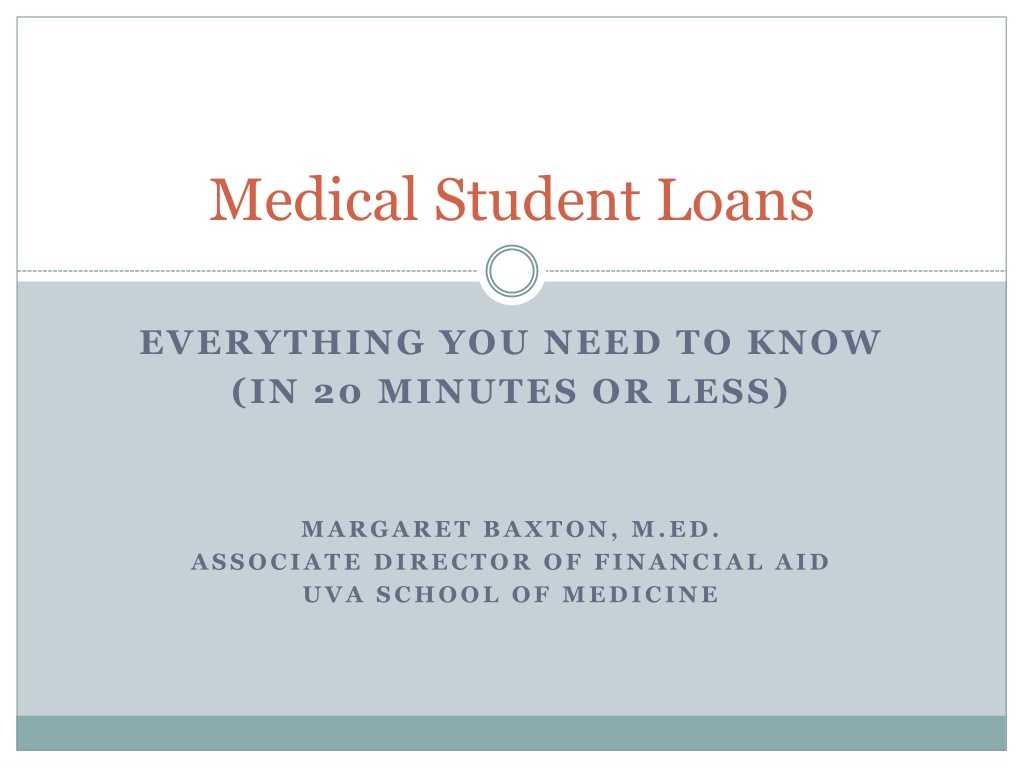
 undefined
undefined








 undefined
undefined











